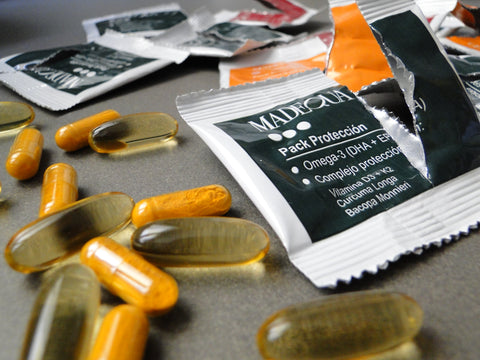Menopause is a time full of changes, and not always easy ones! From unexpected hot flashes to sleepless nights, this time of life can be quite a challenge. But, although it can sometimes feel like a hormonal roller coaster , there are ways to smooth the ride and feel better.
One of the keys may be Omega-3, especially in forms rich in DHA and EPA, that silent ally that you may not have known you needed. Did you know that it can help take care of your heart, your mind and even your skin during this stage? Let's find out how Omega-3 can be your best friend during menopause!
In this blog we will answer questions such as: Why is omega-3 good for menopause?, What are the benefits of omega-3 during menopause? and What is the appropriate intake of omega-3 during menopause?, among many others.
What is Omega-3?
Omega-3 fatty acids are essential for the human body , but our body cannot produce them on its own. Therefore, we need to obtain them through diet or supplements.
The most important types of Omega-3 are DHA (docosahexaenoic acid) and EPA (eicosapentaenoic acid), both recognized for their benefits for cardiovascular, cognitive, anti-inflammatory and skin health.
Why is Omega-3 good for menopause?
Omega-3 is good during menopause due to its multiple benefits at different levels of health . Among the benefits of Omega-3 we will highlight:
-
Cardiovascular Health
During the menopausal transition , which includes the years leading up to and during menopause, the risk of heart disease increases for women. According to the American Heart Association, heart disease is the leading cause of death in women , even surpassing cancer mortality. This makes taking care of cardiovascular health more important than ever .
Omega-3 is good during menopause because DHA has been shown to have protective effects against cardiac events such as myocardial infarction. Thanks to its anti-inflammatory and antiarrhythmic properties, it helps keep your heart healthy.
It also improves the lipid profile , reducing triglyceride and LDL cholesterol levels (the "bad" type) and increasing HDL cholesterol (the "good" type). This is vital, since maintaining lipids at adequate levels reduces the risk of cardiovascular disease.
-
Cognitive Health
With menopause, the loss of estrogens that have a neuroprotective and anti-inflammatory role accelerates cognitive decline. Alzheimer's is more common in women (2/3 are women), since it has been seen that the brain ages worse due to this lack of estrogens, its neuroprotective role is lost . This is where Omega-3 comes in, since it is also good in menopause because DHA , a key component of all Madequa supplements , protects the brain against cognitive decline and neurodegenerative diseases such as Alzheimer's , by acting as a powerful anti-inflammatory and neuroprotector. -
Anti-inflammatory effect
Hormonal changes during menopause bring with them chronic inflammation throughout the body, which translates into joint pain, general discomfort and other uncomfortable symptoms. Omega-3 is effective in menopause because DHA is transformed into molecules that reduce the levels of other molecules responsible for inflammation. -
Skin Health
Another aspect that worries many women during menopause is skin care. During this stage, the skin can lose moisture and elasticity, causing more pronounced wrinkles. Omega-3 is excellent for the skin during menopause because it contributes to improving hydration, giving it a smoother appearance. It's like a little beauty secret that works from within!
We have already seen the many benefits of Omega-3 during menopause. Now comes the next question: What is the appropriate intake of Omega-3 during menopause?
Omega-3 intake during menopause
To get the full benefits of Omega-3 during menopause , it is important to ensure that your intake is adequate.
This involves regularly consuming foods rich in Omega-3 , such as fatty fish (salmon, sardines), walnuts, chia and flax seeds, or opting for supplements that guarantee a concentrated dose of DHA and EPA, as in the case of Madequa menopause supplements .
Their supplements are formulated with specialized gynecologists to ensure that the doses are optimal and effective, to achieve maximum benefit with visible results.
Benefits of Omega-3 in menopause
Taking Omega-3 supplements provides essential support for the body , especially during menopause. Although Omega-3 can be obtained through diet, we do not always get the necessary amounts from food alone .
Supplements provide a constant and concentrated dose of DHA and EPA, fatty acids that contribute to improving cardiovascular health, brain function, and reducing inflammation. They also help keep skin hydrated and improve overall well-being, providing the extra boost the body needs during this stage of change.
At Madequa , we understand the importance of taking care of women's health in a comprehensive way and we know that Omega-3 is a great ally.
Each pack combines Omega-3 (DHA and EPA) with other natural ingredients to offer personalized benefits that address specific symptoms of each stage , helping to improve cardiovascular and cognitive health, and reduce inflammation.
With Madequa , you are choosing high-quality supplements , containing the active ingredients at optimal and effective doses , formulated by specialized gynecologists to ensure you get results.
Find out more about each pack on our website and find the one that best suits your needs. By taking the menopause test you can find out what stage you are in and the pack that best suits your specific needs.
Is it still not clear what benefits Omega-3 can provide during menopause?
Menopause can bring challenges, but you don't have to face them alone. With the help of Omega-3-rich supplements like those from Madequa, you can take care of your heart, brain, skin, and overall well-being. If you're looking for a natural way to feel better during menopause, Madequa is your best bet .
Remember that health is an investment, and taking care of yourself at every stage of life is the key to enjoying it to the fullest. Give Omega-3 a place in your daily routine and feel the difference!
References
Wei BZ, Li L, Dong CW, et al. The Relationship of Omega-3 Fatty Acids with Dementia and Cognitive Decline: Evidence from Prospective Cohort Studies of Supplementation, Dietary Intake, and Blood Markers. Am J Clin Nutr. 2023;117(6):1096-1109. doi: 10.1016/j.ajcnut.2023.04.001.
Dyall SC, Balas L, Bazan NG, et al. Polyunsaturated fatty acids and fatty acid-derived lipid mediators: Recent advances in the understanding of their biosynthesis, structures, and functions. Prog Lipid Res. 2022; 86:101165. doi: 10.1016/j.plipres.2022.101165.
Bernasconi AA, Wiest MM, Lavie CJ, et al. Effect of Omega-3 Dosage on Cardiovascular Outcomes: An Updated Meta-Analysis and Meta-Regression of Interventional Trials. Mayo Clin Proceedings. 2021;96(2):304-313. doi: 10.1016/j.mayocp.2020.08.034.
Allaire J, Vors C, Tremblay AJ, et al. High-Dose DHA Has More Profound Effects on LDL-Related Features Than High-Dose EPA: The ComparED Study. J Clin Endocrinol Metab. 2018; 103(8):2909-2917. doi: 10.1210/jc.2017-02745.
Sparkes C, Gibson R, Sinclair A, et al. Effect of Low Dose Docosahexaenoic Acid-Rich Fish Oil on Plasma Lipids and Lipoproteins in Pre-Menopausal Women: A Dose⁻Response Randomized Placebo-Controlled Trial. Nutrients. 2018; 10(10):1460. doi:10.3390/nu10101460.
Dyall SC. Long-chain omega-3 fatty acids and the brain: a review of the independent and shared effects of EPA, DPA and DHA. Frontiers in Aging Neuroscience. 2015; 7:52. doi: 10.3389/fnagi.2015.00052.
Guichardant M, Véricel E, Lagarde M. Biological relevance of double lipoxygenase products of polyunsaturated fatty acids, especially within blood vessels and brain. Biochimie. 2019; 159:55-58. doi: 10.1016/j.biochi.2018.08.009.
Baechle JJ, Chen N, Makhijani P, Winer S, Furman D, Winer DA. Chronic inflammation and the hallmarks of aging. Mol Metab. 2023;74:101755. doi: 10.1016/j.molmet.2023.101755.
Córdova Aguilar JN. Effect of supplementation with omega 3 in facial skin of patients in a medical center Miraflores district in 2013. Lima: Universidad Femenina del Sagrado Corazón; 2014.
Recommendations for omega-3 intake in the different periods of a woman's life. Progress in Obstetrics and Gynecology, 2014; 57(1), 45–51.
Mosconi L, Berti V, Dyke J, Schelbaum E, Jett S, Loughlin L, Jang G, Rahman A, Hristov H, Pahlajani S, Andrews R, Matthews D, Etingin O, Ganzer C, de Leon M, Isaacson R, Brinton RD. Menopause impacts human brain structure, connectivity, energy metabolism, and amyloid-beta deposition. Sci Rep 2021;11(1):10867. doi:10.1038/s41598-021-90084-y.
Heart disease risk in women increases leading up to menopause; early intervention is key. American Heart Association Scientific Statement. 2020. https://newsroom.heart.org/news/heart-disease-risk-in-women-increases-leading-up-to-menopause-early-intervention-is-key
Omega 3, key to treating and reducing the symptoms of menopause. Isanidad. (2022).https://isanidad.com/210775/el-omega-3-clave-para-tratar-y-reducir-los-sintomas-de-la-menopausia/
Omega-3 fatty acids. National Institutes of Health. 2022.




Comments (0)
There are no comments for this article. Be the first one to leave a message!